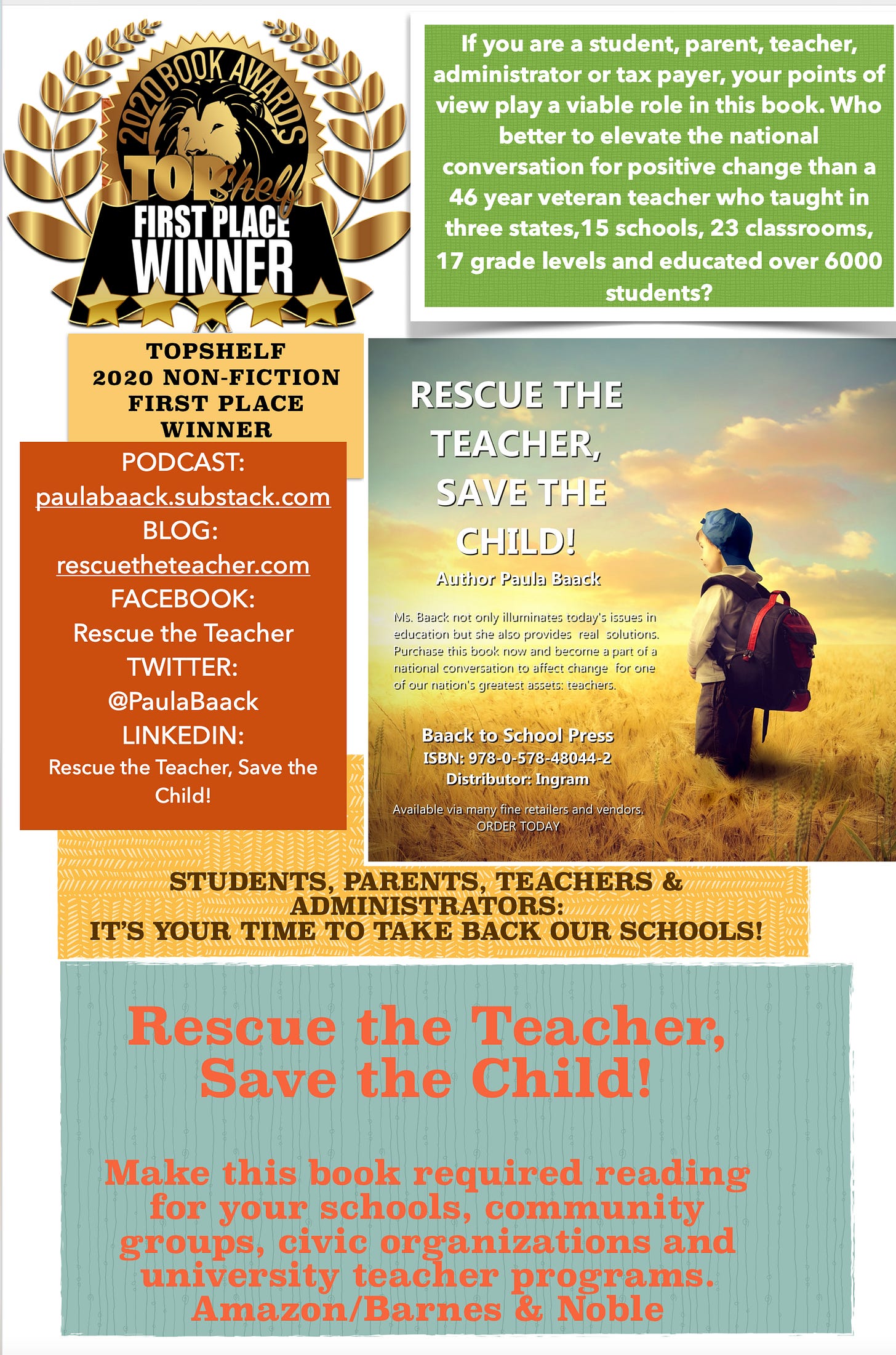EDUCATIONAL REFORM Part I: Ineffectual University Teaching Programs
Teachers' Colleges dismiss proven methods, practical solutions, and real-world experiences with indifference or even contempt.
If you truly want to reform education in this country, you must start at the top: Teachers’ Colleges. From NEA Today: the number of college students studying to become teachers is less than half what it was 50 years ago. Yet our population has increased over three times in that same span.
After 46 years of teaching, my abrupt exit—courtesy of a principal who needed to “trade me in for a younger model”—sparked my desire to tackle the pressing issues in America’s education system. Following the publication of my book Rescue the Teacher, Save the Child in 2019, I was thrilled to receive an invitation to lead a multi-day workshop based on my book at a respected university, school district, and school board. For weeks, I dove deep into research, examining the current state of schools, school boards, and higher education. I purchased hundreds of materials to bolster my presentation and meticulously prepared my lecture. And then, without any warning, I was canceled. My guess? I hold a conservative point of view and a voice that amplifies those views. With a new perspective on America’s political landscape, I believe the time for educational reform is now. The days of "woke" policies, silencing conservative voices, and shutting down differing opinions may be on hold—at least until the next election cycle.
I look back fondly on my college years—there were the parties, sorority life, and all the excitement of football and basketball games. Even back then, I was politically engaged, serving on the university student senate and taking part in protests against the Vietnam War. As for the academics… well, not so much. In my first two years, I couldn’t find a single class that seemed to connect to my future as an educator. I sometimes felt like I was just paying tuition to sit through random, often outdated, courses led by professors who seemed disconnected from the students. It wasn’t until my junior year that I started to see more focus on education theory. I didn’t begin student teaching until my senior year. I often think about my peers who realized, far too late, that teaching wasn’t the career for them.
Fast forward to the 25 years I spent supervising student teachers in the classroom. Early on, the talent pool was impressive, and the passion for teaching was palpable. But over time, that began to change, and not for the better. I started working with student teachers who struggled with basic language skills, had poor work habits, and lacked proficiency in their chosen field of music education. And then it got worse. One student teacher turned out to be a sexual predator, and another clearly should not have been in a university teacher preparation program at all. When I tried to withdraw my approval for these individuals, the university not only ignored my concerns but allowed them to graduate. By the time I reached year 26, I had decided to stop working with student teachers altogether. Do I think my experience reflects what's happening in colleges today? No, factual studies reveal an even worse scenario.
From a study by NPR:
Seven out of ten [university] programs failed to adequately teach reading instruction.
Forty percent of these programs promoted practices that contradicted research on effective reading strategies.
Nine out of ten programs did not properly equip candidates to teach core subjects such as English, math, science, or history.
Training in classroom management was insufficient.
Overall, schools are not doing enough to prepare teachers for the demands of the classroom.
After my book was published in 2019, I reached out to my alma mater, offering to conduct a free seminar for their student teachers—drawing on the insights gained from 46 years in the field—I was met with a lukewarm response from the department chair and two professors. When I tried to set a date, the final reply was… no reply at all. Before the pandemic, I extended the same offer to 15 colleges and universities, and not a single institution even acknowledged my email. Well, except for one department chair, who suggested meeting for coffee in a couple of months once things "calmed down." I suppose that counts as a response. The coffee chat never transpired. Once again, I experienced having my voice and years of teaching experience silenced by liberal department chairs and professors. It’s frustrating when those who should value your perspective seem more focused on maintaining their authority than on actually listening to the people who have been in the trenches.
This lack of responses lays bare what’s wrong with America’s teacher colleges: proven ideas, practical solutions, and real-world experiences are dismissed with indifference or even contempt. What could I, a retired teacher of over four decades, possibly know about pedagogy? Frankly, pedagogy is irrelevant if a teacher can’t create a positive learning environment, enforce fair discipline, communicate with transparency, and manage the ever-more-complex tech system for grading. Subject knowledge alone doesn’t make a great teacher. Why? When classrooms are in chaos, entitled students are setting the rules, and overbearing parents are dictating the outcomes. Add to that the drama and infighting between faculty and administration. Subject matter expertise becomes secondary. In this environment of disarray, children are the ones who suffer—victimized by poor teaching and inept leadership. Is it any wonder our children are struggling in school, and American education ranks 27th in the world?
SOLUTIONS
Recruitment of potential teachers should be implemented by teachers’ colleges in every high school.
Professors at teacher colleges should have at least five years of recent (defined within the last five years) experience working in public schools.
To ensure ongoing relevance, professors should be required to spend time in public schools every five years, prioritizing practical experience over academic research. University professors often struggle to grasp the daily challenges of classroom management, as often they have not faced those realities in a public school setting. Without hands-on experience, they cannot fully comprehend the rigorous demands placed on teachers today.
Experienced, successful teachers (or even us retired teachers) should lead weekly workshops and monthly seminars for future educators, as we bring real-world insights that professors, who often lack real classroom experience, may not fully understand.
Teacher preparation programs that fail to produce effective educators should be given a set deadline to improve their curricula or face a loss of federal funding.
TUNE IN. Here’s a tease to Part II: What do entitled parents, hostile emails, and spineless administrators have in common? They're all key factors driving teachers out of the profession at unprecedented rates.








A great look into what is hurting teachers.